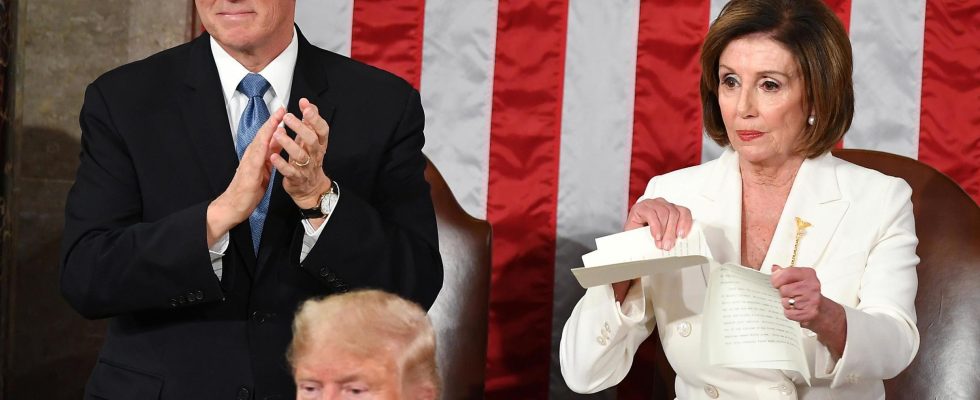For the first time in the history of Congress, the leader of the House of Representatives has been removed from his post. Initially modeled on the ceremonial and order-maintaining role of the British speaker, the function of speaker gradually gained importance in the United States until it became an essential position in the American legislative system.
5 mins
His role is not even specified in the American Constitution, yet he is usually considered the third most important political figure in the United States. If he is, in fact, the second person in the line of succession of the American president after the vice-president, as the person in charge of presiding over the debates of the House of Representatives, the “speaker”, as it is commonly known called, has an eminently political role.
Initially modeled on the role of the “speaker” of the British House of Commons, the head of the American House of Representatives initially had a ceremonial role and one of maintaining order in the hemicycle, but he quickly politicized and has become over the years an essential cog in American politics.
Read alsoUnited States: the President of the House of Representatives impeached, a historic first
Elected for two years, the “speaker” is appointed by a majority of the 435 members who make up the Chamber. He is therefore, barring any unlikely surprises, on the same political side as the majority of members sitting in the hemicycle. This greatly influences his role at the perch, because if the majority in the House of Representatives is favorable to the American president, the “speaker” will have the main task of facilitating debates and ensuring that the legislative agenda of the White House be adopted without incident while ensuring the unity of its political bloc.
But the mandate of “speaker” really takes on its full importance when the House is dominated by a majority hostile to the president, as is currently the case with a Republican majority in the House of Representatives which opposes the policies of Democrat Joe Biden. The “speaker” then takes on the role of number one opponent of the presidential program.
Influence on the legislative agenda
To play this role, the rules of the House of Representatives give the “speaker” several administrative powers, in particular that of setting the legislative agenda of the House. It is he who decides when each bill is presented and debated, an advantage which, when used wisely, can have a real impact on the adoption or not of a text.
During Donald Trump’s presidency, Democrat Nancy Pelosi, the first woman to hold the position of head of the House of Representatives, succeeded with her majority in blocking the wall project on the Mexican border wanted by the billionaire, by refusing to vote on the federal budget if the project was included in the budget bill. This then had caused a historic “shutdown” for almost a month and the White House finally gave in. By playing the obstruction card, the “speaker” and his majority can therefore largely influence the political agenda and force the White House to negotiate to pass its laws.
Furthermore, the head of the House of Representatives also has great influence over the appointment of members of most commissions and some committees. He also has the power to launch commissions of inquiry, as Kevin McCarthy did about the president’s son, Hunter Biden, shortly before being dismissed. Investigations which can lead to the launch of “impeachment” procedures as was the case twice against Donald Trump when Nancy Pelosi occupied the perch.
“ Nothing is put to a vote without his agreement »
Depending on his political affiliation, the head of the House of Representatives is therefore a strong ally or a thorn in the side of the tenant of the White House and his influence is very important. “ The speaker is a very powerful character, nothing is put to a vote without his agreement “, summarizes political scientist and United States specialist Nicole Bacharan.
The historic impeachment of Kevin McCarthy nevertheless brings the House of Representatives into a gray zone never seen before, because without a “speaker” the entire legislative process could be paralyzed. “ We are witnessing a historic first which opens up real uncertainty, particularly regarding the functioning of the Chamber in the coming days, analyzes Julien Toureille, researcher in residence at the Observatory on the United States of the Raoul Dandurand chair at Uqam in Quebec at the microphone of RFI. Will it be able to work on its essential tasks, in particular negotiating new budget laws? “.
Democrats and Republicans agreed on October 1 on a draft provisional financing law to avoid a “shutdown”. But this budget plan is only valid for 45 days and it does not include military financing for Ukraine. Time is therefore running out to find a successor to Kevin McCarthy. For the moment, it is the representative of North Carolina, Patrick McHenry who is acting, but he does not have the power to lead the House and can only preside over the election of a new “speaker”. He hopes that the election of a new leader of the House of Representatives can take place by next week. A calendar considered very optimistic by many observers.
